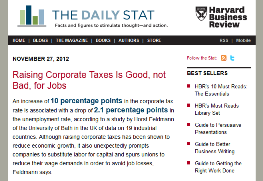Can We Save Jobs By Raising Corporate Taxes?
 Harvard Business Review’s The Daily Stat this week spotlighted an article from Public Finance Review that is the first to empirically study the impact of corporate taxes on the unemployment rate, and reveals some surprising and significant findings. From the Stat:
Harvard Business Review’s The Daily Stat this week spotlighted an article from Public Finance Review that is the first to empirically study the impact of corporate taxes on the unemployment rate, and reveals some surprising and significant findings. From the Stat:
An increase of 10 percentage points in the corporate tax rate is associated with a drop of 2.1 percentage points in the unemployment rate, according to a study by Horst Feldmann of the University of Bath in the UK of data on 19 industrial countries. Although raising corporate taxes has been shown to reduce economic growth, it also unexpectedly
prompts companies to substitute labor for capital and spurs unions to reduce their wage demands in order to avoid job losses, Feldmann says.
You can read the complete article in Public Finance Review, “The Unemployment Puzzle of Corporate Taxation,” by following this link. Concluding that the predicted effect is one of significant magnitude, Dr. Feldmann writes in his abstract:
Using annual data on nineteen industrial countries for the period 1979–2005 and a large number of controls, this article is the first to empirically study the impact of corporate taxes on the unemployment rate. In contrast to previous empirical research on the labor demand, investment and growth effects of corporate taxation, which consistently finds adverse effects, the regression results suggest that higher corporate taxes may have a favorable impact, lowering the unemployment rate. The magnitude of the estimated effect is substantial. The results of this study are robust to both endogeneity and numerous variations in specification.
Stay on top of findings like these from PFR by signing up for e-alerts! Economists, policy makers, political scientists, and researchers rely on PFR for the most up-to-date information and to help them put policies and research into action.































































































